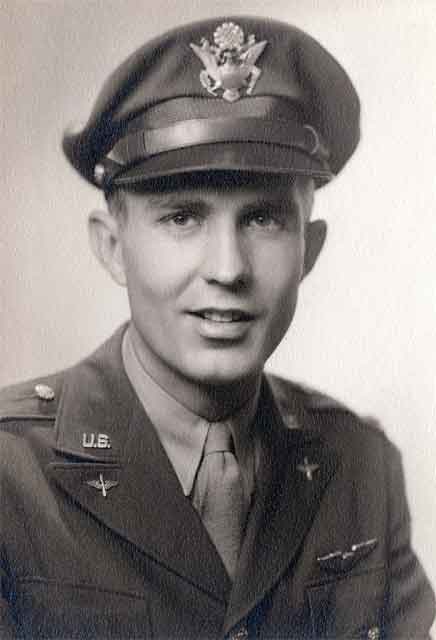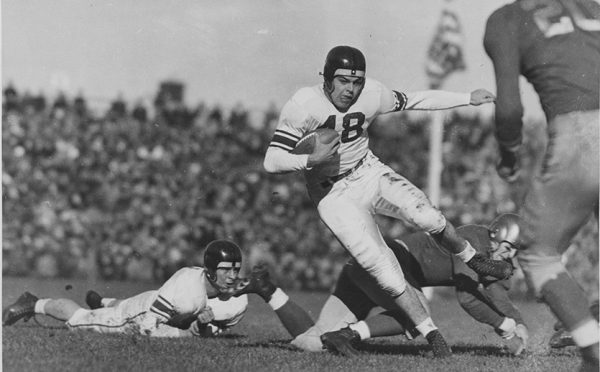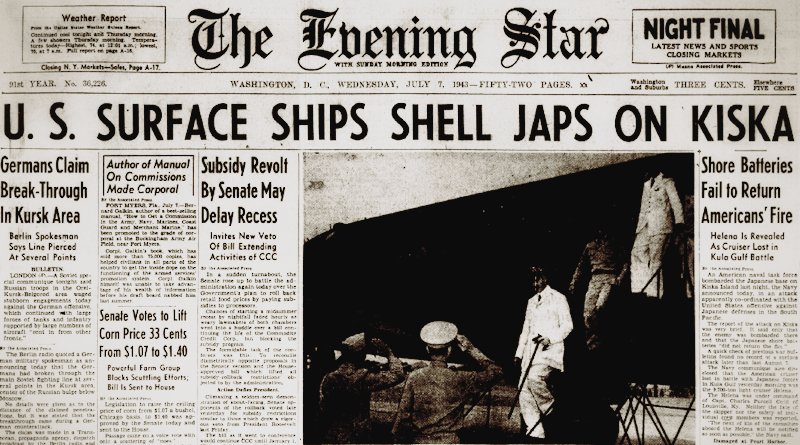World War II Chronicle: July 7, 1943
Click here for TODAY’S NEWSPAPER
The Germans claim they have broken through the Soviet lines at Kursk. Hitler’s Operation Citadel will soon grow into the largest tank battle in history… The light cruiser USS Helena (CL-50) was sunk yesterday in a nighttime battle with a squadron of Japanese destroyers in the Solomons…
George Fielding Eliot column on page 10… An Army Air Force bomber crew has accidentally attacked Boise City, Okla. Fortunately for residents, the B-17 dropped training bombs, which are filled with sand and powder (see page 16). You are probably wondering how a bomber crew accidentally attacked a town. Well, it was a nighttime mission and the range was supposed to be lit on four sides, marking the target area. Boise City’s courthouse square was similarly lit on four sides, 30 miles north of the range. Local soldiers got on the radio to inform the Dalhart Army Air Base that one of their bombers was attacking a town. Headquarters radioed the airborne Fortresses that one of them was hitting Boise City, but the offending crew continued dropping their remaining ordnance, thinking they were in the right spot. It wasn’t until a worker threw the power switch that darkened the town did they realize they were the delinquents. The crew was reprimanded, but a year later were part of the Eighth Air Force’s first attack on Berlin…
Page 31: Martin B-26 Marauders are now flying for Maj. Gen. Jimmy Doolittle’s Strategic Air Force. One of the Marauder pilots is former baseball player Lt. James E. Conlan. He had a brief minor league career and was signed by the Yankees, but retired from baseball and became a pilot. A veteran of 47 combat missions, Conlan also flew B-25s and C-47s, receiving eight Air Medals and the Purple Heart. The Marauder is a medium bomber. What is the difference between a medium bomber, light bomber, and heavy bomber? A light bomber carries around one ton of ordnance and were phased out before World War II, the medium carries two, and a heavy bomber can carry four or more…
Col. Arman Peterson, beloved commander of the 78th Fighter Group is reported as missing (see page 35). We mentioned Col. Peterson last month, and here’s this from the American Air Museum in Britain:
“The day ‘Pete’ didn’t come back” reshaped the course of the 78th. Officers flew frantic and vain search missions. Ground personnel went around, scuffing their shoes into the dust and digging their hands deep into their pockets. Bob Hope and Francis Langford arrived to entertain us, but their show began to fall flat. “What’s wrong with these guys” Hope wanted to know. He was told. And what a show that trouper put on in the old theatre hangar, in an attempt to help the boys forget.

Sports on page 46, which lists players that will appear in the College Football All-Star Game against the NFL Champion Washington Redskins. Northwestern senior Otto Graham is named. Graham went to Northwestern on a basketball scholarship and didn’t begin playing football until his sophomore year. He is named All-American in 1943 (football) and 1944 (basketball), lettered in baseball, and was quite the musician as well. He transfers to Colgate University to be part of the V-5 aviation cadet program and later plays football for North Carolina Pre-Flight Cloudbusters.

Missouri halfback Bob Steuber will start playing for the Bears once the College All-Star Game is over. He too resumes his college career once Steuber begins aviation training at Depauw University and leads the nation in scoring this season. Paul Brown will sign both Graham and Steuber to play for him at Cleveland after the war… United Aircraft News on the back page, featuring a picture of Sikorsky helicopters.
Roving Reporter by Ernie Pyle
(continued from yesterday)
NORTH AFRICA — (by wireless) — Bill Stevenson, the head of the American Red Cross in Africa, has been married 17 years and has two daughters, 15 and 14. Mrs. Stevenson is just as handsome as her husband, and the two stand out in a crowd because of their smart good looks.
Mrs. Stevenson’s name is Eleanor, but it is a name so long unused that she probably wouldn’t respond if you called her by it. Her name before her marriage was Eleanor Bumstead, and ever since she has been known as Bumpy.
The two met while Bill was at Oxford in the middle 20’s. Bumpy’s father had gone to England on business, and Bumpy went along. She and Bill knew of each other but had never met.
Bill says Bumpy followed him to England and asked him to marry her. Bumpy says, well, whet the hell if she did?
There is a sort of unspoken rule in the Red Cross against husbands and wives being together, but in this case it is unthinkable that Bumpy should not be along. The two operate as a mechanism. Bumpy wears a Red Cross uniform, and in addition to a terrific amount of headquarters work she is a sort of roving delegate, cheerer-upper, smoother-over and finder-outer for the whole Red Cross of Africa, and half the Army too. She travels a lot, and everywhere she goes she lends her pretty ear to tales of woe, turns her pretty smile on generals and privates without distinction, and gives her strong shoulder to be wept upon by all and sundry.
Bill calls her “the G. I. girl friend.”
“I have to be super-nice to everybody,” Bill says with a laugh, “because I never know whom I’m talking to. Soldiers come barging into my office and sit and talk by the hour. I’ve got work to do but I don’t dare hurry them off, for it’s probably Bumpy’s latest boy friend. It’s always either generals or privates with Bump. Nobody in between stands a chance.”
Bumpy and Bill have a way with them of making everybody crazy about them. Bumpy especially is a sponge that attracts the spilling of private griefs. The soldiers think she is wonderful. She is always getting herself in a mess by going to bat for somebody she thinks is being mistreated. Like Bill, she is in work up to her ears and has no axes to grind.
To everybody who knows them, Stevenson is Bill and Mrs. Stevenson is Bumpy, but to each other they exchange the latter for the slightly more intimate Bump and Billy.
The Stevensons have an Oldsmobile sedan for their own use over here. They live in a small but nice apartment on a hilly street. They have no servants and seldom eat at home. It’s easier and cheaper to eat at the Red Cross mess downtown.
Both are blessed with indifference to social-climbing. They have entree, as a matter of course, to high circles, but they are the kind who don’t need to be seen with the right people. They dine with Lieutenant General Spaatz, for instance, not because he’s a general but because they like him and have business to talk over with him. They have no purely social life whatever. They can skip that for the duration.
The Stevensons have been overseas more than a year now. They were in England together, and Bumpy followed Bill down here. Bill had a few bad days when he heard Bumpy’s boat had been sunk, but it turned out she was on a different boat.
Bumpy has not been back to the States at all, but Bill took a flying trip home this spring to thresh out some details at Washington headquarters. He did his business, saw their two children, stayed a total of three weeks, and was glad to get back over here.
Bumpy’s presence in a theater of war with her husband is a strange repetition of history. The whole thing parallels the experience of her own parents. In the last war her father was on the faculty at Yale and frequently went to England to give special lectures at Cambridge. He was there when we entered the war in 1917 and was immediately appointed scientific attache of the American Embassy in London. So Mrs. Bumstead left her children wit their grandmother and went to England to be with him.
Today Bumpy’s daughters are left in the hands of their grandmother while Mama works overseas. Bumpy says she remembers when her mother went away to war and how lonely and horrible she felt, yet what a thrill it was to show off before the other kids in a sort of stuckup way about having your mother overseas. And when Bumpy left for England in the spring of 1942 one of her little girls said as she kissed her goodby:
“Mummy, we’ll be awfully lonesome, but we’re awfully proud too.”
Meaning, mainly, as Bumpy says, that they can go around bragging about it.
Evening star. (Washington, D.C.), 7 July 1943. Chronicling America: Historic American Newspapers. Lib. of Congress.
https://chroniclingamerica.loc.gov/lccn/sn83045462/1943-07-07/ed-1/
